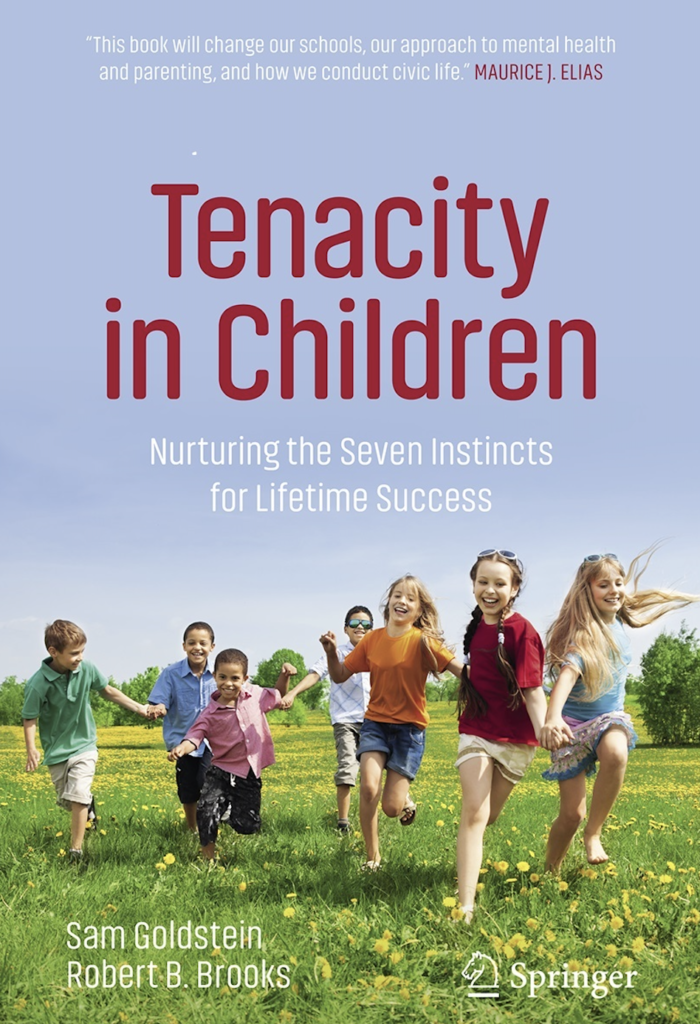We are very happy that you like sharing articles from the site. To send more articles to your friends please copy and paste the page address into a separate email.Thank You.
Printer-Friendly Version | Email Article
 This article is the third in a series that my colleague and friend Dr. Sam Goldstein and I have co-authored to share some thoughts about the concept of tenacity as introduced in our most recent book, Tenacity in Children: Nurturing the Seven Instincts for Lifetime Success. In April we described the seven instincts of tenacity, and last month we highlighted one instinct, Compassionate Empathy, to illustrate the lifelong impact of each of the instincts. We noted that while we are certain that more than seven instincts exist, we believe these seven, which have evolved over thousands and thousands of years, have been most influential in ensuring the success and survival of our species.
This article is the third in a series that my colleague and friend Dr. Sam Goldstein and I have co-authored to share some thoughts about the concept of tenacity as introduced in our most recent book, Tenacity in Children: Nurturing the Seven Instincts for Lifetime Success. In April we described the seven instincts of tenacity, and last month we highlighted one instinct, Compassionate Empathy, to illustrate the lifelong impact of each of the instincts. We noted that while we are certain that more than seven instincts exist, we believe these seven, which have evolved over thousands and thousands of years, have been most influential in ensuring the success and survival of our species.
We purposely chose the word instinct to indicate that the seven are present from birth as evidenced by the early rudimentary manifestations of such attributes as optimism, intrinsic motivation, empathy, and altruism—all waiting to be nurtured and brought to fruition by parents and other caregivers. In light of the significant role these instincts assume throughout our lives, we believe it is imperative for parents, educators, and mental health and childcare professionals to strive to identify and reinforce them in children.
Brain Dance and the “Unholy Trinity”
In our May article we asserted that in order to effectively reinforce the seven instincts of tenacity, we must also understand and counteract the negative forces that work against their blossoming. While there may be a number of such forces, we propose that there are three prominent ones that contribute noticeably to many of the adverse events in today’s world. We refer to these as the “unholy trinity,” and they include a rigid adherence to belief, a fear of difference, and defensive aggression.
In examining the features of the unholy trinity, we wish to cite the work of neuro-anthropologist Dr. Dean Faulk and what she referred to as brain dance in her 1992 book by the same title. In defining the term, Faulk pointed out that all humans are susceptible to brain dancing, and at any given moment our response to a perceived threat or stress can trigger a loss of control and the emergence of aggressive and unthinking behaviors.
In Tenacity in Children, we posited that the three instincts that fall under the umbrella of the unholy trinity are largely responsible for the presence of brain dancing. It’s important to understand that at one point in our evolutionary process these three played a significant role in the early survival of our ancestors over tens of thousands of years, but as modern society grew, they shaped divisiveness and chaos, eventually weakening our well-being and effective adaptation. In reading a newspaper or visiting a webpage or watching the news, one will quickly be informed of the many destructive events that have occurred during that day in the world—events that we believe are rooted in the workings of the unholy trinity, whether alone or in combination.
Isms such as racism, sexism, and ageism, to name just a few, are expressions of the unholy trinity. Consider that ideological differences are at the root of conflict between and among political parties, countries, and ethnic, religious, or economic groups. The destructive, illegal, and at times unprovoked aggressive actions of many are justified by belief. Each group believes they are right and others are wrong. Far too often differences among people and groups are not celebrated but feared. This fear serves as a catalyst to protect ourselves and our group from a perceived threat, and these attempts at protection often find expression in attacks directed towards the “other” group.
Thousands and thousands of years ago in the absence of facts and science, beliefs as seemingly simple as the sun will rise each morning helped humans to move forward. Also, it is likely that our ancestors survived in part by avoiding difference, foraging in the same place, drinking from the same water source and, when possible, sleeping in familiar places in which they felt safe. And when these sources of safety were perceived to be threatened by those who were not part of our group, aggressive behavior followed. Nowadays, these instincts sow mistrust and rigid, negative beliefs that separate rather than connect people.
Returning to Faulk’s notion of brain dancing, she noted, as others have, that the human brain evolved from the oldest parts in the back to the frontal lobes, and that the latter bears responsibility for guiding us to think rationally and logically in the face of problems and stress. However, that responsibility is often challenged since it is the middle of the brain that receives information about the world a few milliseconds before the front of the brain; thus, it is the middle of the brain that directs our response to the world, not in a rational way but rather on an emotional basis.
Given this situation, Faulk suggested that the process of maturation involves learning how to provide the front of the brain sufficient time to process what the middle of the brain is already aware of and ready to act upon. We believe that rather than brain dance in the presence of a perceived threat or stress, we can learn to open a window between experience and response, choosing a rational, as opposed to an emotionally driven, solution to problems that confront us. This perspective was succinctly expressed by renowned psychiatrist and Holocaust survivor Viktor Frankl when he asserted, “Between stimulus and response there is a space. In that space is our power to choose our response. In our response lies our growth and our freedom.”
In his book Man’s Search for Meaning, Frankl applied this perspective to his experience during the Holocaust, a time when the unholy trinity found expression in horrific forms such as the systematic extermination of Jewish people. Frankl poignantly observed, “We who lived in concentration camps can remember the men who walked through the huts, comforting others, giving away their last piece of bread. They may have been few in number, but they offer sufficient proof that everything can be taken from a man but one thing: the last of the human freedoms—to choose one’s attitude in any given set of circumstances, to choose one’s own way.”
Frankl continued, “And there were always choices to make. Every day, every hour, offered the opportunity to make a decision, a decision which determined whether you would or would not submit to those powers which threatened to rob you of your very self, your inner freedom; which determined whether or not you would become the plaything of circumstance, renouncing freedom and dignity to become molded into the form of the typical inmate.”
These very powerful words capture the belief that even in the presence of the darkest, most powerful expressions of the unholy trinity such as existed during the Holocaust, there were women and men who, almost against all odds, lived by the instincts of tenacity.
How best to combat the forces of the unholy trinity? We believe a key strategy is to nurture the seven instincts of tenacity in ourselves and our children. This is why we have urged parents, educators, and all others involved in the care and raising of children to provide the latter with opportunities to develop the instincts of tenacity, to strengthen these instincts and increase each child’s ability to manage irrational beliefs, be accepting of differences, and solve problems without resorting to aggression.
We realize that cultivating the seven instincts of tenacity can be a formidable task at times, but it is essential that we persist lest we experience a world dominated by the unholy trinity. We believe that strengthening the attributes housed in the seven instincts such as empathy, compassion, altruism, fairness, responsibility, and optimism will increase the chances of having a future filled with greater hope, one in which all of our relationships are respectful, caring, and supportive.
Let us consider the words of Anne Frank, a child of the Holocaust. She wrote, “I keep my ideals, because in spite of everything I still believe that people are really good at heart.” The words “really good at heart” capture our belief in the existence of inborn, positive instincts waiting to be harnessed from the first moments of our lives.
*****
This is my last article until September. As we are all aware, this past year has been very stressful. Depression, anxiety, and other mental health issues have risen in all age groups. As the situation with COVID is improving and as more and more individuals are getting vaccinated, I do hope that the months ahead find us returning to some semblance of normalcy, of greater in-person connectedness with others, and an increased sense of comfort and hope.




